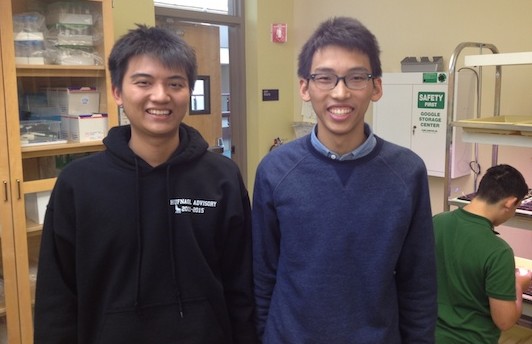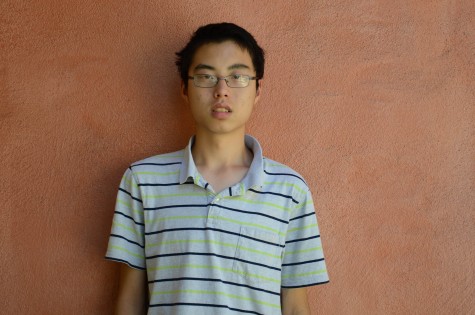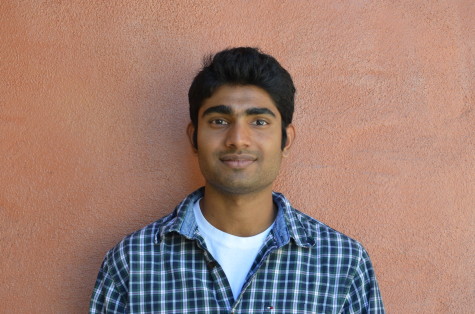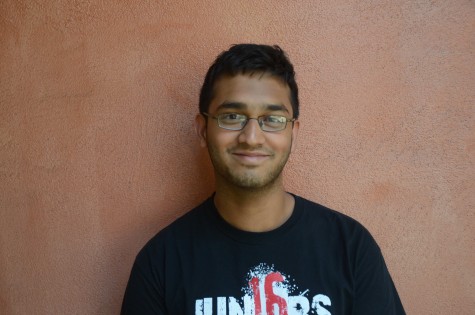Record number of Intel STS finalists announced

Steven Wang (12) and Andrew Jin (12) were two of Harker’s three Intel’s finalists. Harker set a new national record with 15 semifinalists and 3 finalists.
The Intel Science Talent Search announced the finalists of its science research competition on Wednesday morning. Upper School seniors Andrew Jin, Rohith Kuditipudi and Steven Wang were among those named.
This year, Harker had seen 15 students pass to the semifinals round. For the semifinalist round, 300 individuals were selected from 1,800 contestants. Later an additional 40 finalists were selected and invited to Washington D.C. for the final judging.
Steven Wang (12) worked on a project involving colorectal cancer.
“I discovered new potential driver genes for colorectal cancer by analyzing large genomic databases,” Steven said. “Additionally, I tested two well-known drivers from my study in a novel organoid model (a mini-organ system).”
Andrew Jin (12) focused his research efforts on evolutionary genetics with regards to mutations in the human genome.
“I used powerful machine learning algorithms to systematically identify adaptive mutations across the full human genome, showing the computer 7.5 million simulated mutations in order to teach it how to recognize features typical of ones under selection,” Andrew said. “By analyzing massive public genomics datasets, I found that these [adaptive mutation candidates] play roles in crucial processes such as immune response, metabolism, and brain development.”
Rohith Kuditipudi (12) worked with fatty liver disease and its progression. He is most anticipating the trip to Washington D.C.
“As far as what I’m excited about, meeting the president tops the list,” Rohith said.
Out of all the schools that participated in the Intel research competition, the Upper School sent the most finalists this year as well as the most semifinalists.
The Upper School was first represented in the competition with one Upper School semifinalist in 2006. The number has grown annually ever since.
This pattern of growth seems to have been a trend starting from the year 2006 when it sent its first semifinalist to compete. The number has been growing ever since.
According to the Intel Foundation’s press release, the competition now features a $150,000 cash prize for the top three finalists. Second place candidates will be offered a $75,000 cash prize and third-place candidates a $35,000 prize.
Science teacher and Research Club advisor Chris Spenner believes that the Upper School provides a sizable foundation for pursuing scientific research.
“Harker students have access to tremendous opportunities related to science research, starting with a strong foundation of academic skills,” Spenner said. “The science department offers a range of science project support, including sponsorship for a number of competitions and symposia, clubs, lab access, project-specific classes, summer travel experiences and science internship programs.”
Spenner added that the success behind student research can be attributed to their own affinities for research.
“All of the privileges in the world don’t matter unless students are motivated to make use of them,” he said. “And we certainly have motivated students.”

Stanley Zhao (12) is the business manager of the Winged Post. He is a senior this year. Stanley is part of the math club and is currently conducting a...

Vedant Thyagaraj is the Science & Technology Editor for Harker Aquila. He is currently a senior and has been on staff for the past three years. Vedant...

Vineet Kosaraju (12) is the STEM Editor for both Harker Aquila and Winged Post. He is a senior and has been part of the journalism program for the past...


















![“[Building nerf blasters] became this outlet of creativity for me that hasn't been matched by anything else. The process [of] making a build complete to your desire is such a painstakingly difficult process, but I've had to learn from [the skills needed from] soldering to proper painting. There's so many different options for everything, if you think about it, it exists. The best part is [that] if it doesn't exist, you can build it yourself," Ishaan Parate said.](https://harkeraquila.com/wp-content/uploads/2022/08/DSC_8149-900x604.jpg)




![“When I came into high school, I was ready to be a follower. But DECA was a game changer for me. It helped me overcome my fear of public speaking, and it's played such a major role in who I've become today. To be able to successfully lead a chapter of 150 students, an officer team and be one of the upperclassmen I once really admired is something I'm [really] proud of,” Anvitha Tummala ('21) said.](https://harkeraquila.com/wp-content/uploads/2021/07/Screen-Shot-2021-07-25-at-9.50.05-AM-900x594.png)







![“I think getting up in the morning and having a sense of purpose [is exciting]. I think without a certain amount of drive, life is kind of obsolete and mundane, and I think having that every single day is what makes each day unique and kind of makes life exciting,” Neymika Jain (12) said.](https://harkeraquila.com/wp-content/uploads/2017/06/Screen-Shot-2017-06-03-at-4.54.16-PM.png)








![“My slogan is ‘slow feet, don’t eat, and I’m hungry.’ You need to run fast to get where you are–you aren't going to get those championships if you aren't fast,” Angel Cervantes (12) said. “I want to do well in school on my tests and in track and win championships for my team. I live by that, [and] I can do that anywhere: in the classroom or on the field.”](https://harkeraquila.com/wp-content/uploads/2018/06/DSC5146-900x601.jpg)
![“[Volleyball has] taught me how to fall correctly, and another thing it taught is that you don’t have to be the best at something to be good at it. If you just hit the ball in a smart way, then it still scores points and you’re good at it. You could be a background player and still make a much bigger impact on the team than you would think,” Anya Gert (’20) said.](https://harkeraquila.com/wp-content/uploads/2020/06/AnnaGert_JinTuan_HoHPhotoEdited-600x900.jpeg)

![“I'm not nearly there yet, but [my confidence has] definitely been getting better since I was pretty shy and timid coming into Harker my freshman year. I know that there's a lot of people that are really confident in what they do, and I really admire them. Everyone's so driven and that has really pushed me to kind of try to find my own place in high school and be more confident,” Alyssa Huang (’20) said.](https://harkeraquila.com/wp-content/uploads/2020/06/AlyssaHuang_EmilyChen_HoHPhoto-900x749.jpeg)


